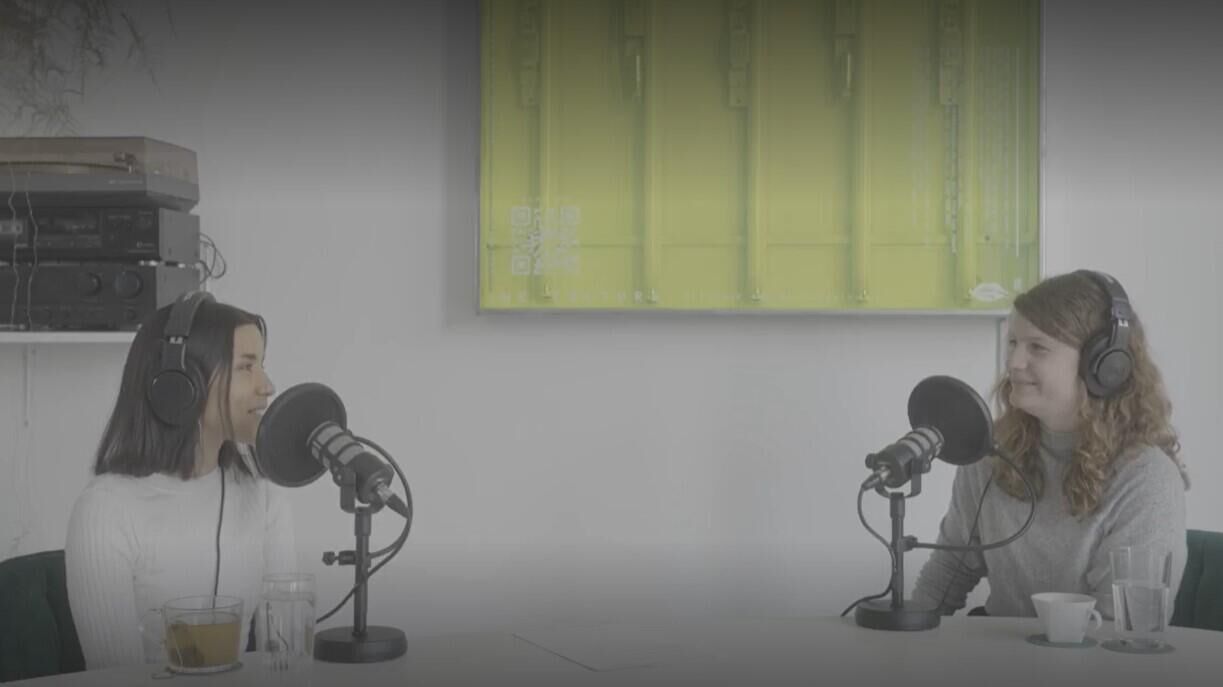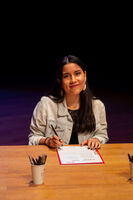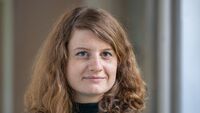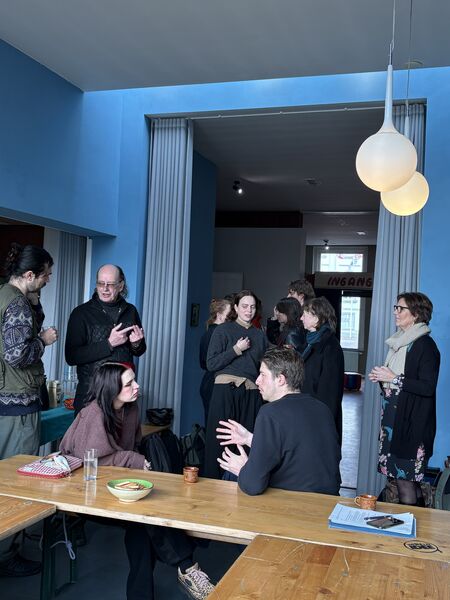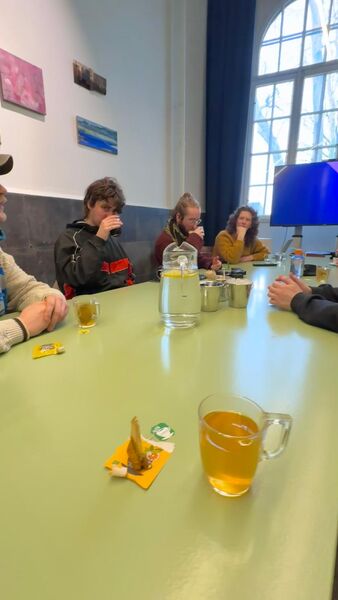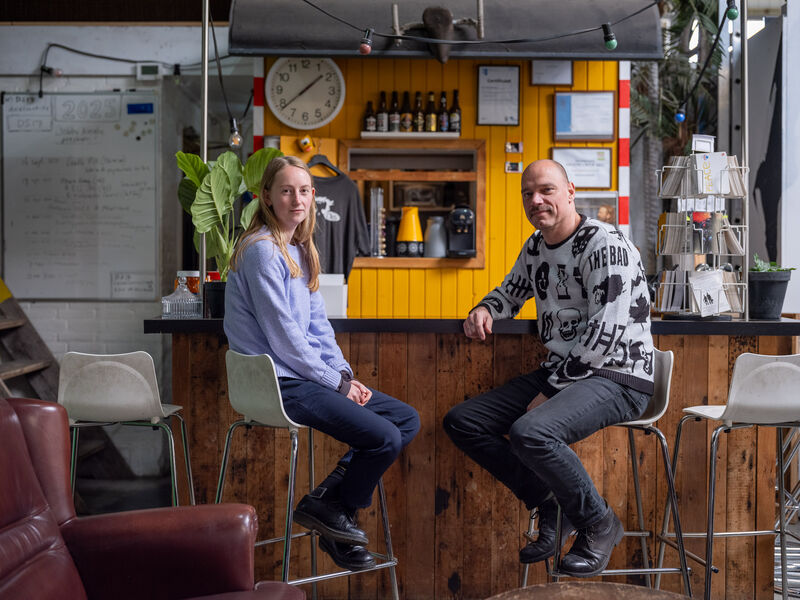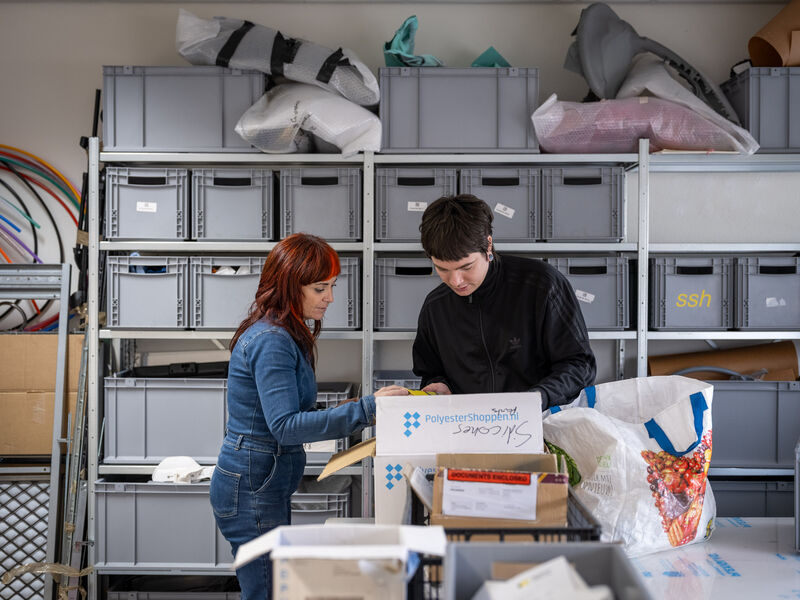Transcriptie Hub! #2.5
Intro: Hé, je luistert naar Hub! In deze podcast van TalentHub Brabant gaan makers uit verschillende kunstdisciplines met elkaar in gesprek over hun werk en drijfveren. Ook vertellen ze over wat het talentontwikkelingstraject dat ze deden bij TalentHub Brabant hen gebracht heeft en delen ze tips en tricks voor makers. Vandaag te gast Juliana Erazo en Urša Prek. Juliana is een van oorsprong Colombiaanse visual artist. Ze maakt niet alleen geanimeerde documentaires, maar werkt ook als freelance illustrator en motion graphics kunstenaar. Urša is een interdisciplinaire kunstenaar uit Slovenië. Haar werk, variërend van beeldende kunst tot geluidsinstallaties, focust op het begrip ruimte. Deze podcast wordt in het Engels voortgezet.
Juliana: Hi Ursa, how are you?
Ursa: Hello Juliana. I'm good. I'm good. How are you?
Juliana: I'm good, thank you. It's nice to see you.
Ursa: Yeah, likewise.
Juliana: Well, since we have the same experiences with the TalentHub. I want to ask you, what did this experience with the TalentHub bring you artistically?
Ursa: It's a interesting question, because sometimes I feel like in the artistic way, like with the way of working for me, it kind of stayed the same. So it's still like the processes are very similar as they were before. But definitely for the TalentHub, what it brought me is really the fact that I can focus on my work more. So for me, being part of Inversie is really about getting some space and time for my own practice. So that would mean that, sometimes you just need some sort of a push or some sort of let's say, bigger objective that's from the outside that makes you to focus more and to actually trust yourself that you can do it either way. So for me, that was a big step. And of course also when I was applying for the TalentHub, like the most intriguing part for me was the mentorship. So yeah, that was very helpful because when you get out of the academy, like all of a sudden you're left there alone and you're constantly like, you're used to discuss your work a lot before that. At least in my case, it was like that, like I started in Slovenia. When I came to the Netherlands, it was a bit of, okay, how can I establish myself also personally, not only artistically or finding a job, I mean, like paying your rent is also important. So I felt like I was a bit stuck in the sense of how to now kick start what I really want to do. So for me, in the artistic realm or how to work, basically what it brought me, it was really that like let's refocus again. And let's just do it like no excuses anymore. And it's definitely worth to put a lot of effort into it and have also something out of it. And my mentor is also a great person. He really helped me to push to have that extra push and just say, okay, you know, you're good at what you do. Just do it and don't don't hesitate too much. And what about you?
Juliana: Well, for me, I think it's also interesting what you're saying about having time and space. I definitely think that having the space and the support to work on my own projects, gave me a lot of insight and sort of like this, this free time where I can just be myself and explore what I really want to talk about with my work. So I definitely think that the artistry and the inspiration comes from the times where you're not stressing out about so many things. And for me, Playgrounds, the Next TalentHub Program, really brought me into this mind space where I can just like do some soul searching and also like, well, changing countries made me insert myself in this new space where I can just explore and find out what I really want to. Like what is my new voice here? And I think another thing that is really important from the TalentHub is the way that you relate to others in the talent group and the way that it nurtures you as an artist. So it's of course like the mentorships are amazing, an amazing way to kick start, like your artistic endeavors for the year, but also the way that you can connect and create relationships with the people that are doing either living the same thing as you are and that have the same interests or also they do the same that you do. You feel a lot more inspired. So I think it was an inspiring experience artistically like with in any front that you look at it.
Ursa: Yeah, exactly. I completely agree. For me it's like most of the meetings that we have, you know, I'm always really looking forward to it. Because you just come out of it so inspired and you're like, oh yeah, we have the same issues as well, you know? I just love that. It's something that I also started to realize now during the whole process that actually I know for sure I just want to be involved constantly with art, in one way or another. And that's a big plus for me also.
Juliana: It’s a very big win. And what did it bring you? The traject personally?
Ursa: The focus especially. So for me it really opened up this world. Before I thought it was a bit hard to reach. And that also goes a bit in the entrepreneurship part. So it's like meeting the actual people who are the gatekeepers or like meeting curators, meeting other artists that are already established. Like all of this, this whole playground of of art field in the Netherlands all of a sudden opened up for me. And kind of it became demystified. So it's let's say that before I always felt like a sort of an outsider, because you come somewhere you don't know really how it works. Like you're trying to understand where your position is or where you actually belong, so to speak. And I think that goes also for the personal aspect, right? So you have the same experience. So I think that we can really relate to each other. But yeah, it's a little bit of search, like when you come to a to a living room of someone that you've never been before and you're trying to find a place to sit down or something. It's kind of that sort of how I see it. So for me, that was a big part that I finally find a place to sit down. Okay, now I'm in the right company. I love the people that are around me and let's just have coffee in the living room, you know? So I use some sort of a metaphor for this. But a lot of it was just understanding that these people are just people. And that we're all trying to do something and that we're all in this together and we can talk to each other the same as with everybody, you know? So for me, that was a big step also in the terms of being an entrepreneurship role because a lot of times it's scary. As a young artist it's kind of scary to just walk up to the director of an art space or museum or whatever and start to talk about things. So for me, that was a big step. And yeah, also my work helped me a lot, because I work part time in TAC, so I work with other artists a lot. And all of this together just helped me a lot. So. So I'm really glad about this. And how about you? Because I don't know a lot about Playgrounds, how it works, so I'm curious.
Juliana: I think for me, it was a big changing moment personally, because the talent program Next really allowed me and pushed me to take the big step of moving to the Netherlands. So it gave me a reason to move. And because of course, I did my Master of Animation here, but still I didn't have much to start building on. And this whole thing of being in the talent development, I think it's a difficult choice to make to leave home. This one was just like the little push that I needed. And that sort of acted in a domino effect way in my life. So it just made me take decisions a bit easier because I felt that I had a huge support behind me. Not only the people in running the program, but also, the people that are in the talent traject with you. They just become like your network and your safe space. When you're not home, you have to start building your network also like your own family. I always say to Paulien for example and Maureen that they're kind of mother figures in this space that we have. And for me that really meant just like having a family outside of the country and in the new country. So personally, it made me, also because I loved your metaphor, I think for me, the metaphor is sort of like I'm growing the roots stronger, like a plant. So yeah, definitely it was a moment of growing personally. And obviously this involves also inspiration for the artistic things. So I think everything is connected. And since we're like on the note of talking about entrepreneurship, you kind of mentioned it. Can you elaborate more on what did it bring you in your entrepreneurship?
Ursa: Well, aside of all the practical things, of course. I think that they're very much important. I don't know how to prepare a proposal for the subsidy application or, yeah, everything that's involving money and networking and trying to kind of establish yourself in this environment. So those things, of course, are very much important. But I would say that they're not too interesting in a way, right? So at least not for me. I have to say that I'm not really money driven, but it's very necessary to have it so you can actually do a project. So I'm happy that I got this knowledge as well. And it's not completely up to me to just Google it. So in this sense I'm super grateful for that. And especially the writing thing, like proposals, applications, all of this, this is something that I am interested in because I love writing. So I'm really curious about how to do this and how to manoeuvre in this playground, if you call it like that. But mostly it was really, um, how to present yourself, I would say. But not in the sense presenting yourself as reconstructing of who you are or being very intentional about this, but just being more paying attention to yourself. Like paying attention to the detail. This is how I work. This is who I am. If I look back at my work I see this red line or this thread that comes across it. So I understand better how to actually communicate to people, how to get to certain art spaces that are valuable for me in my work. Because of course there are so many different types of art. There are artists and it really depends on every programming, what you do and what you don't do. So I think that's the most interesting part for me. It's really this sort of mapping of the space that we are moving in. So in terms of entrepreneurship, I would say these are the things that I'm mostly interested in and that I really enjoy also talking about and listening with other people with expert meetings and everything that we have with our TalentHub. So yeah, that would be for me, but I suppose we also come from very much different fields, but not also that different, you know. So I guess for you it's an other way of dealing with things.
Juliana: Being part of the TalentHub brought me a couple of things. Of course, first one, to have enough contacts so that I am visible for new clients. That they can show my portfolio and they can be a platform where I can show my work. That has connected me to clients and of course like entrepreneurship, because I'm here on the basis of being a freelancer. It really helped me out to start building my new client base here in the Netherlands. But on the other side, the TalentHub was also very directive. It was very specific to each talent. There were people in film and illustration and animation and specifically, I think having some coaching about creative entrepreneurship for me was really important and also building my own business. Of course I have to relate to clients, but then I also have to work on the own goals that I set myself and all of these things that I didn't think about before, like marketing myself. And as you were saying, the way that you present yourself and setting goals for some stuff that can be doable and realistic goals. And the urgency of the goals for me. Of course, since I went to art school and then I focused on the animation master, it was about making and you are always on the artist side. And then the business side sort of pushed in the back. But with the TalentHub I could also have the space and the time to say I need to plan this business because I'm working as a self-employed here. So I really need to pay attention to that. And another thing is to relate to the people in the TalentHub in your trajectory, but then also in other trajectories. It just automatically broadens your network in a huge way. Not only the talents, but also the mentors. So it's basically like a full year of networking, which is always really good for entrepreneurs.
Ursa: It's kind of building the relationship and it's always valuable. I think either also on personal artistic expression, I would say. I remember you said something about putting your roots down, right? So I'm kind of curious how do you see this routing, if we just take this word, like here in the Netherlands in connection to your own work? Because I know that I'm familiar a little bit with your practice. We also worked together before. So I'm curious, how does that relate to, for example, the research of your motherhood topic or like this sort of women topics going back in the past of your identity and now you're in a new space and you say, okay, for me it's putting out roots. So I see that again in some sort of motherhood process, you know, like routing, building stability in a certain space. I'm curious, how do you relate to that, like in your practice?
Juliana: I think for me, it's like as time goes by. I realize that what I'm always looking for is connection. Before, when I realized that motherhood was something that I wanted to explore. I always thought, like it's sort of going back and looking at my family and I just want to have a family portrait. And I'm really obsessed with the way that Colombian women build their own identity with being a mother. But coming here and feeling that I'm sort of like cutting the umbilical cord from my mother and from my grandmother and from a whole generation of women in Colombia and sort of starting a new generation here. I just found myself with so many questions. I'm a woman. So people in my country and in my culture expect me to have kids, and most of society expects you to. So I'm questioning all these things to me and in this new year of changes and changing countries and changing seasons and everything is like, I never experienced this so much, like feeling this is my new home. So I started to feel like a bit disconnected and looking, trying to find the stability that you're talking about. And I thought that, well, maybe here I can start to connect with more women because I'm pretty sure there's a lot of women that are going through the same, like questioning. And the more I opened up the space to have discussions about motherhood, the more I realized that there's this sort of thing, this sort of perfect motherhood that everyone talks about but no one really has. And yeah, this has just allowed me to have more open conversations with women. And I also think that here in the Netherlands, because there is such an international community, big community. It really helped me to connect with more people from around the globe than if I was in Colombia. Because there's just like a few experiences of motherhood, womanhood there that I could connect to. So definitely it changed my view. I think it's, it's like when you, for example, like when you're painting and you're like getting away from the canvas and then you see the big picture. I think it kind of felt like that when I moved to the Netherlands. Because changing countries like this, changing everything. It just made me decide I need to have something like setting foot. And I think it's also nice to talk about the whatever network and connections that I got from the talent development program. I think it grew so much with my project because I kept on looking for more. It gave me an excuse also to keep on making more connections, to hear more people. Definitely longing for growing my roots and making connections. It's a part of me wanting to stay here.
Ursa: I see a lot of crossover, you know, also with my own practice.
Juliana: I wanted to ask about you because it's the same. I'm pretty sure it's the same experience when you moved here. And also it's really interesting that you work with space and that you sort of mapping. You do the mapping of space and all of that. And I'm curious like, how do you experience these new spaces that are completely different?
Ursa: For me, I am curious about space for quite some time actually. So I think that the fact that I moved to the Netherlands was just like putting oil on the fire. So it kind of made me even more curious about space, but not only in the sense of strictly physical space or where you are, what you are occupying, but in the broader sense of your context. Let's say more personally. So the context is also your own history. And then history is always connected to certain spaces or certain identities or environments in the end of the day. So if you think about it as a landscape and I saw when you were speaking, I kind of already imagined this landscape of your past and how your relationship was with your mother and your grandmother and what does that mean now? I think in that sense, it's very similar because for me, what I'm curious about is what does it do to you basically, right? So who are you when you think about yourself in relation to to the context in which you are? So I think okay, it's about life, but of course it's more than that. So the first time I actually really dived into it like really more intimately, it was quite some years ago actually, but back in Slovenia my father passed away. And then I started to research his apartment because we were not really living together. So the apartment was sort of this weird in-between zone for me because I only remembered it like the last time I was there. I was maybe a kid, I don't know, three, four years old. So then when I came back to it, after all these years, as 20 something, I just felt really odd, you know? When I stepped in, I immediately felt okay, what is happening here? For me, this is not just a random space, but at the same time it's also not my home. What I'm curious about is really this moment in between. When you can't really pinpoint what's going on. But then all these questions arise and it feels like, okay, I need to sort of map this out for me and apparently also for other people, of course. My work is not so much about stating something or saying I need to communicate something specific. It's mostly just trying to make sense of things that I encounter. So I would say I usually refer to it as mapping, because it's a lot about observation and then trying to dissect it or decompose it in a way that can rebuild itself back in some sort of coherent project. So after that then I currently now I'm working mostly on projects that are related to space, but they're also related a lot to memory and how we deal with it basically. So how do you connect yourself to certain memories and your own history? And again I like these moments in between. Memories that you can't remember. And then trying to re-enacting them to implement your own past back in yourself again. So I'm very curious in this kind of manoeuvres, in this sort of non space you would say, or maybe even non time. So it's a lot about space and time and memory for me. I think that's sort of the crossover that I feel also with your work that it's maybe more connected on social scale. Correct me if I'm wrong, but I'm curious, would you say that you have a certain thing that you want to communicate or is it something that's also more research based or trying to like having more this personal connection to to your own work?
Juliana: I definitely came in with an idea before the research. I just had this idea I just want everyone to know that women are like carrying a burden and sort of being super biased because of course, I was trying to find my own self and what I thought about motherhood and just really skewed personal views on it. But after the research and after talking to so many people, it just made my guard go down a lot and just let the research happen and just let the film happen. And it was such a beautiful thing because I think in a way, I was having so much resistance to it and now I just feel like I needed to know if I wanted to be a mother or not. In the beginning of the project, I said I'm doing this project because I'm in the age where I have to decide if I want kids or not. And the more that I spoke to people, to different kinds of women, to trans women, to men about this, I realized I don't have to know. I'll never have to know. If I don't have kids. It's fine. If I have kids, it's fine. I know a lot of people that like through this research I got to know and got to talk about experiences that I otherwise would have never heard of. And I think that for me is what I'm saying, like letting the research happen and letting the research happen to me. Not just like trying to direct it and trying to force something on it. It's a huge change, like a mindset change. And with the TalentDevelopmentProgram, I really didn't think that I was going to think about these things. I'm just going to animate and illustrate and whatever. But now I'm feeling like I'm personally just growing so much, which is also very good. So to wrap this really nice conversation up, I think it would be nice after all of this year and this experience, if you have important tips for the people that are watching and listening to us.
Ursa: Well, I can outsource also from what you just said. So I think that the personal and the artistic is very hard to separate. So I would say that especially in this, we're talking a lot about intimacy also. So this research question that you came from in your own dilemmas or your own struggles, so to speak. And for me it's the same. So what I would say for as a advice or whatever is just really stay true to yourself. If you feel like what you're doing is a necessity, is something that you cannot live without, basically. and you can easily test that with just try not to go to your studio or try not to do anything artistically for like four months. I doubt that you can make it, you know? So if you can't make it without it, just be persistent. So I think that that was a big lesson also for me, like be persistent and have this trust in yourself in a way that what you do is interesting. And be patient. And very much about persistence, I need to emphasize that. That would be my advice, I think. Okay. And for you?
Juliana: For me, it's on the same note of the research thing. It's just letting change happen. I definitely came to the Netherlands with the idea that I was just going to stay here for a year, and that's it, I'm going back. That changed. My whole relationship with motherhood changed. The whole world changed with Corona. Everything is changing. And that was really an important tip with business and entrepreneurship workshops: just give yourself some time within your planning to stop and assess is what I'm doing is serving me of something or do I need to change the plan? And for me that is really important because before I was like, okay, this is the goal, this is where I'm heading. It doesn't change. It’s always going to change. Either you want it or not. So just be prepared and allow it to happen.
Ursa: I heard this nice quote from a friend of mine, basically. And what he always says is like, don't plan because plans always change. So I think that's a good note to keep in mind, I think.
Juliana: It was so nice to talk to you. Definitely, I really enjoyed it. Thanks for opening up and sharing this with me.
Ursa: Likewise. Yeah, it was great.
Outro: Deze podcast werd gemaakt door Aswin Baaijens in opdracht van Kunstloc Brabant. Wil je meer weten over de ontwikkeling van toptalent in de professionele kunsten in Brabant? Check dan: www.talenthubbrabant.nl
